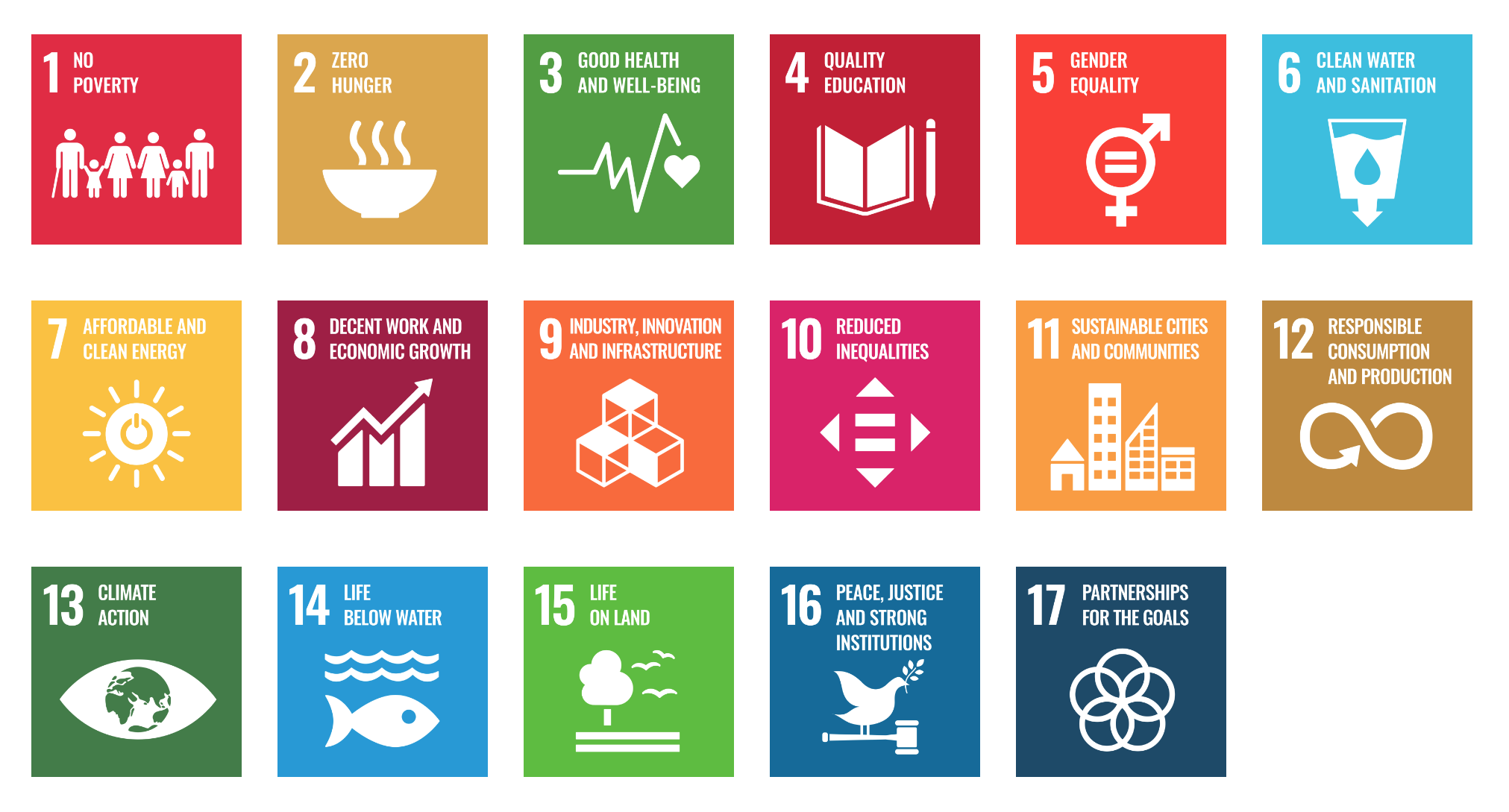The University of Pittsburgh is currently ranked as one of the premier research institutions in the country. As a result, this research often sparks countless innovative ideas, many of which are progressing towards a more sustainable future. This blog article looks at how those ideas have contributed/are contributing to the Sustainable Development Goals (SDGs) of the United Nations.
Here’s a look at the UN’s 17 SDGs:

Also, did you know that Pitt’s Sustainability Plan has 68 goals within 15 impact areas? Learn more about them here.
These SDGs are the blueprint to achieve a better and more sustainable future for all. They address the global challenges we face, including those related to poverty, inequality, climate change, environmental degradation, and peace and justice. The 17 goals are all interconnected, and in order to leave no one behind, it is important that we achieve them all by 2030.
How Pitt Student & Alumni Innovators are Making a Difference
There are several Pitt student/alumni startups that are taking these goals seriously in their own work. To name a few...
Eco-Soap Bank
After witnessing soap accessibility issues firsthand while working in Cambodia, Samir Lakhani (DSAS ‘14) founded Eco-Soap Bank. Eco-Soap Bank seeks to provide soap and hygiene education to developing countries. Their process involves collecting and sanitizing leftover soap and providing that soap to humanitarian organizations working in remote regions of developing nations. These organizations share their mission to improve hygiene, and they work within their communities to create a positive shift in hygiene behavior. Eco-Soap Bank also employs local women in search of reliable incomes. Watch this video to learn more:
UN Sustainability Goals Targeted: Good Health & Well-being, Sanitation, Decent Work and Economic Growth, Reduced Inequalities, Sustainable Cities and Communities, Responsible Consumption & Production
Korion Health
Seeking to make healthcare more accessible and equitable to all, Anna Li (MD/PhD '28) founded Korion Health. Korion Health makes heart and lung screenings more accessible by offering an electronic stethoscope and guided user interface so that patients can record their heart sounds from the privacy, comfort, and convenience of home. Watch this video to learn more:
UN Sustainability Goals Targeted: Good Health and Well-being, Reduced Inequalities
FlowCellutions
Becca Segel is a Pitt chemical engineering PhD student who is passionate about fighting climate change and preserving ocean habitats. She founded FlowCellutions, a premier battery diagnostics company, with a philosophy focused on making a dent in carbon emissions through advancing energy storage, facilitating sustainable business practices, and forming lasting connections with others in the energy space to transform electricity reliability together. Becca also says that “as a women-owned business, we embrace innovation and equality in the workplace.” Watch this video to learn more:
UN Sustainability Goals Targeted: Affordable and Clean Energy, Climate Action, Industry, Innovation, & Infrastructure, Sustainable Cities and Communities, Gender Equality
Ecotone Renewables
Current Katz MBA student and Ecotone Renewables COO Kyle Wyche (DSAS '19, MBA '24) has been using his background in ecology to uplift local communities. Ecotone Renewables has a mission to make sustainable food and agriculture systems more accessible and prevalent outside the industrial scale. They manufacture and operate ZEUS (Zero Emission Upcycling System) Digesters which process 12 tons of food waste a year and produce their signature organic liquid fertilizer, Soil Sauce. Watch this video to learn more:
UN Sustainability Goals Targeted: Zero Hunger, Reduced Inequalities, Responsible Consumption & Production, Sustainable Cities and Communities
How Can You Use These Goals to Spark Your Own Idea?
Take a look at all 17 SDGs. Choose one (or a few!) that sparks your interest. What are the problems that need to be solved in order to achieve that goal? Who is impacted by and/or cares about this specific problem?
Ideate
What are some ideas that could help address the specific problem? This is the time to think outside of the box and brainstorm. Take everything into consideration. What are you NOT thinking of? Don't be afraid to think big or think crazy. That's when you start to enter unexplored areas!
Empathize
Consider how the intended beneficiary / user would benefit from each idea. Also consider the impact of each idea – is this for a small group of beneficiaries, can it benefit others, is it adaptable to other situations/areas/etc.? Your customers will make or break your idea. You need to make sure you understand the problem your audience has if you want to start solving it.
Prioritize
After ideating and empathizing, it is time to stick to your best idea. Consider the following questions:
- Why should I care about this problem?
- Is this idea practical/feasible - is this idea likely to succeed or be effective in real circumstances?
- Who is your intended audience - who is experiencing the problem?
- Is this idea helpful - is it solving the problem of your intended audience?
- Which Sustainable Development Goals does this idea contribute to?
Congratulations! You have just developed your own Big Idea! Would you like to put it to practice? We offer several programs at the Big Idea Center that help student entrepreneurs progress in innovation. You can receive FREE mentoring from our Entrepreneurs in Residence (EIRs) and compete in our programs to earn up to $25,000 to get your idea off the ground! The possibilities are endless. Learn more HERE.